Key takeaways:
- Film festivals serve as a launchpad for independent films, providing networking opportunities for filmmakers and engaging discussions for audiences.
- Streaming has transformed film festivals by increasing accessibility, leading to heightened competition and enabling real-time audience engagement through social media.
- Experiences at festivals often foster unforgettable connections and insights, highlighting the emotional power of cinema and the importance of community.
- Attendees are encouraged to maintain a flexible schedule, network with others, and actively participate in panels to maximize their festival experience.
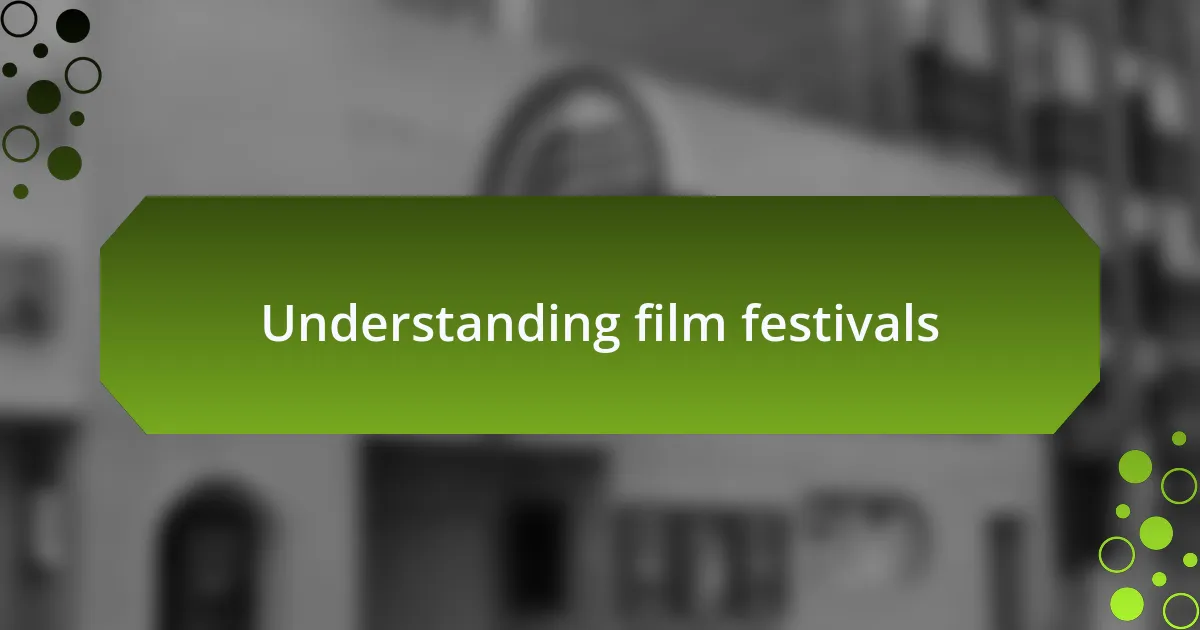
Understanding film festivals
Film festivals are fascinating events that celebrate the art of cinema while bringing together filmmakers, critics, and movie lovers. I still remember my first experience at a local festival, where the energy was palpable; it felt like the entire community had gathered to witness stories come to life. It was exhilarating to see so many diverse voices on screen, each with their unique perspective.
These festivals often serve as a launchpad for independent films that might otherwise go unnoticed. I think about how many incredible stories gain recognition at events like Sundance or Cannes, providing opportunities for filmmakers to network and connect with distributors. Isn’t it remarkable how these gatherings can alter the trajectory of a film’s life?
Additionally, attending a film festival allows audiences to engage in discussions that go beyond the screen. I recall the profound conversations I had with fellow attendees after watching a powerful documentary; we shared our experiences, reflecting on the themes presented. This exchange of ideas enriches the viewing experience and fosters a deeper appreciation for the artistry involved in filmmaking.
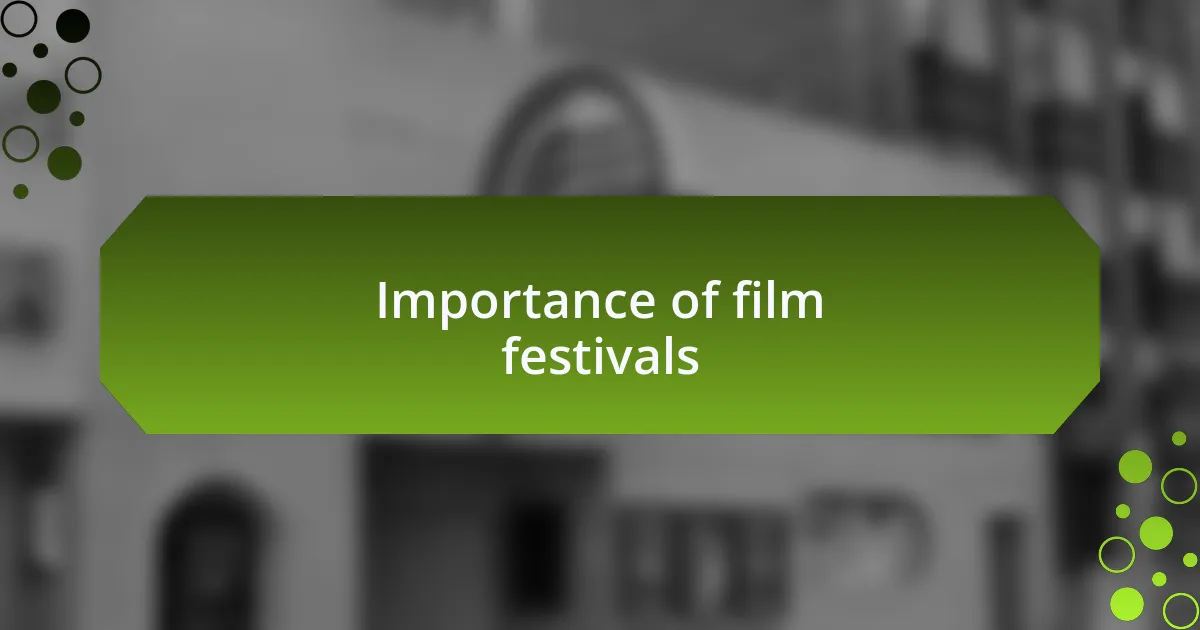
Importance of film festivals
Film festivals hold tremendous importance not only for filmmakers but also for audiences seeking authentic cinema. I remember standing in a packed auditorium, the anticipation buzzing in the air before the screening of a debut feature from an unknown director. That collective excitement highlighted how festivals cultivate a sense of community, where shared experiences can ignite conversations that go beyond mere entertainment.
Moreover, these events play a vital role in showcasing underrepresented voices in the film industry. I once stumbled upon a short film that tackled a taboo subject; its screening prompted an eye-opening dialogue among attendees, revealing how vital it is for diverse stories to have a platform. How else can we foster understanding and empathy if not through the rich tapestry of narratives presented at festivals?
Additionally, they create opportunities for networking and collaboration among creatives. It was fascinating to watch filmmakers pitch their projects between screenings, each vying for attention and funding. This real-world interaction often sparks collaborations that can lead to groundbreaking work, reminding us that the heart of cinema lies in the connections made behind the scenes.
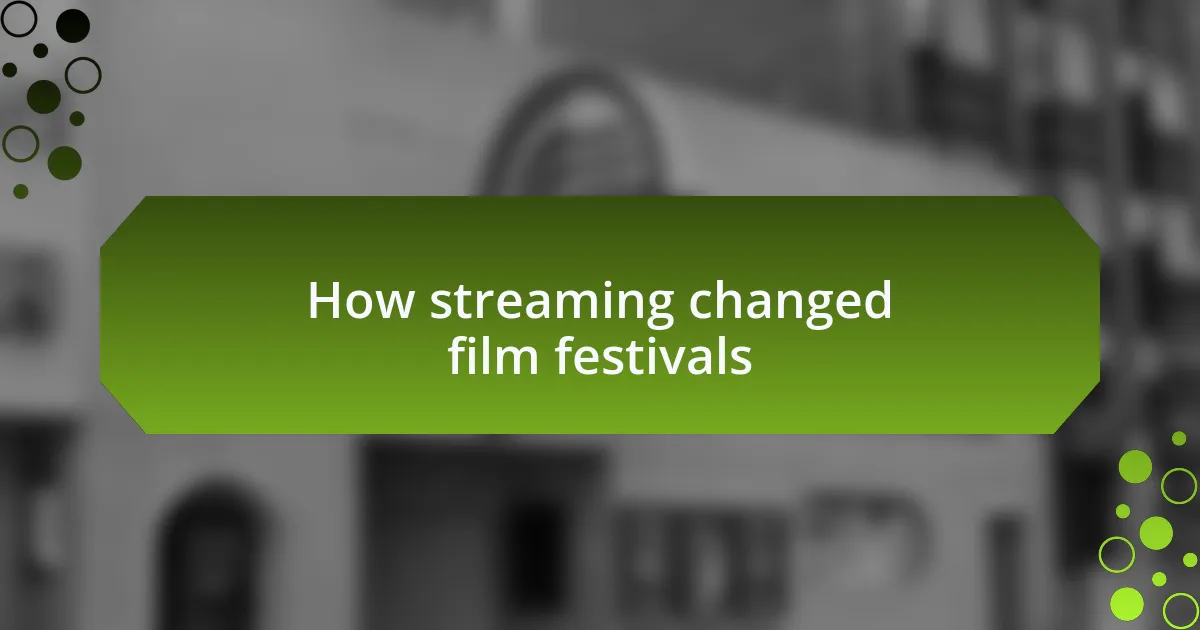
How streaming changed film festivals
The rise of streaming has dramatically shifted the landscape of film festivals, creating a more accessible platform for filmmakers and audiences alike. I recall attending a virtual festival during the pandemic, where directors I admired shared their work from the comfort of their living rooms. It struck me how streaming allowed people from all over the world to experience these films without the barriers of travel or ticket sales.
With streaming platforms now hosting their own film festivals, I’ve noticed that the competition for attention has intensified. A question often comes to my mind: How do filmmakers stand out in such a crowded marketplace? I remember scrolling through an online festival lineup and feeling overwhelmed by the sheer number of choices. It’s both exciting and daunting, making it crucial for creators to invest in strong narratives and marketing strategies.
Furthermore, the immediacy of streaming releases has led to a shift in how films are consumed and discussed. I’ve seen audiences engage with films in real time through social media, sparking conversations that ripple far beyond the festival experience. It’s amazing how a tweet or a post can elevate a film’s visibility, turning a hidden gem into a viral sensation overnight. This evolution prompts us to consider: In this fast-paced digital age, how do we preserve the essence of the festival experience while evolving with technology?
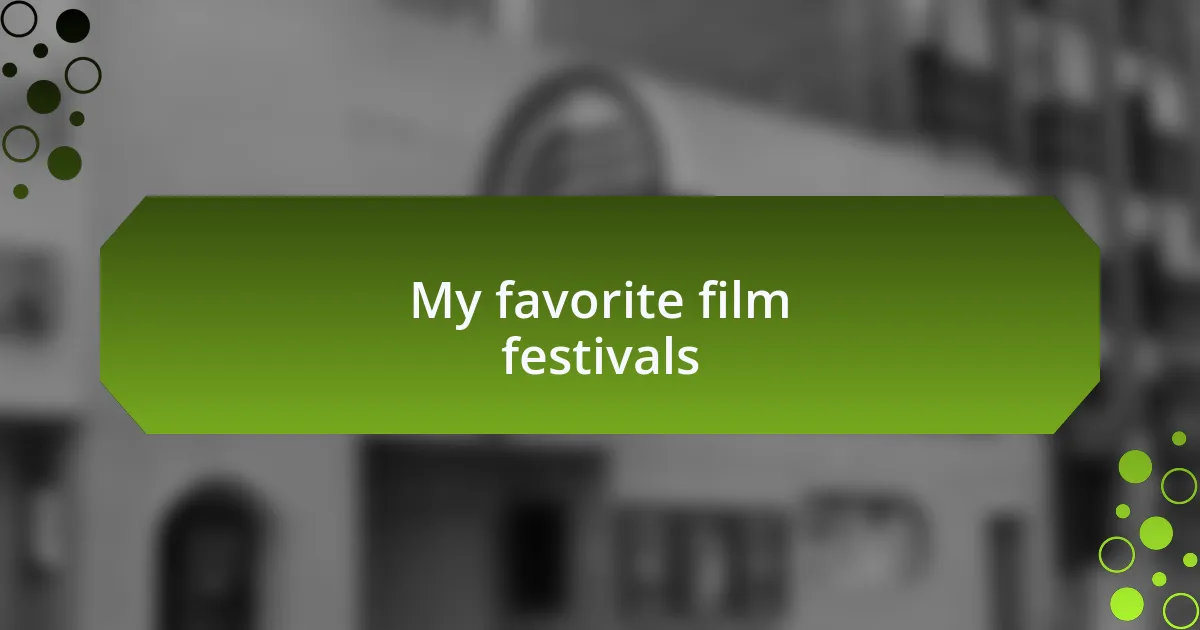
My favorite film festivals
My favorite film festival has to be Sundance. I remember my first time attending — the crisp mountain air mixed with the electric excitement of independent cinema was just intoxicating. Each film felt like a personal revelation, and sitting in those packed theaters, I could sense the collective anticipation from the audience. When a film struck a chord, the energy was palpable, making me reflect on how stories can unite us in unexpected ways.
Another festival that stands out is the Cannes Film Festival. While I have yet to experience it in person, following its highlights each year fills me with awe. The glamour, the iconic red carpet, and the prestigious films showcased there draw my admiration. I sometimes wonder, would attending Cannes change my perspective on filmmaking? The blend of artistry and industry at Cannes is intriguing, underscoring filmmaking as both a passion and a profession.
Lastly, I have a soft spot for the Toronto International Film Festival (TIFF). The festival feels like a warm embrace for film lovers and filmmakers alike. I vividly recall the buzz surrounding a particular screening I watched online, where the director participated in a lively Q&A afterward. The connection between the audience and creators made me think about how crucial such interactions are in enriching our experience with film. How often do we get to engage directly with the minds behind the stories we cherish?
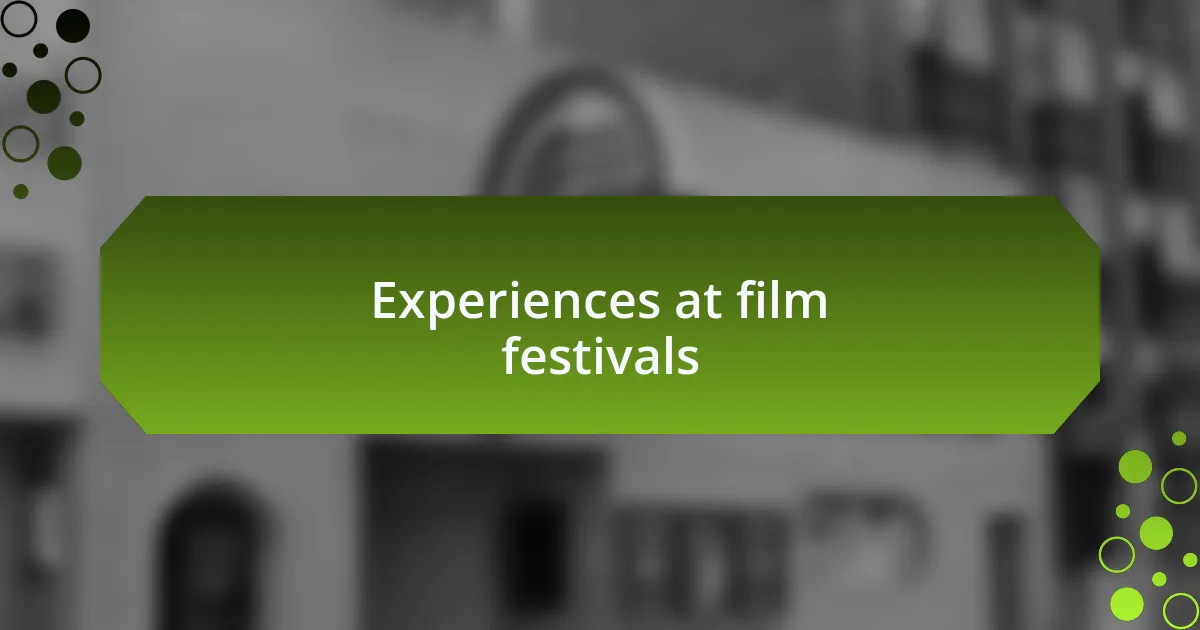
Experiences at film festivals
Experiences at film festivals often create unforgettable connections that extend beyond the screen. I remember stumbling into a small venue during a lesser-known festival, where I sat next to someone who turned out to be a cinematographer. Our shared enthusiasm for the film sparked a conversation that lasted well into the night. How often does one find such serendipity in everyday life?
The atmosphere at these events can feel almost like a collective heartbeat. I was once in a crowded hall when the lights dimmed for a powerful documentary. The resonance of the subject matter left the audience in stunned silence, and you could sense the emotional weight in the air. It’s moments like these that remind me of the universal language of cinema and its power to evoke empathy.
Not all experiences are glamorous; some can be humbling. At one festival, I attended a workshop where the director candidly discussed their struggles and failures. Hearing their vulnerability made me realize that behind every polished film is a journey filled with challenges. It’s this openness that transforms film festivals into spaces of growth and learning. Have you ever left a screening with a desire to pursue your own storytelling? I often do; that fire to create is a gift these festivals continually ignite in me.
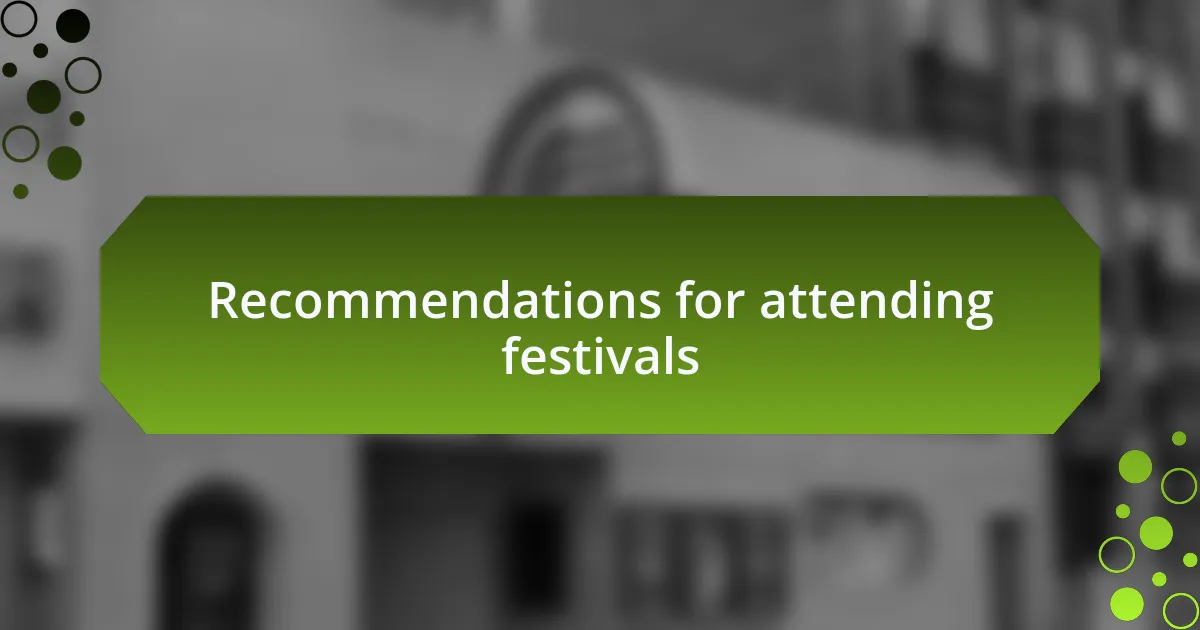
Recommendations for attending festivals
When attending a film festival, I highly recommend preparing a flexible schedule. I recall one festival where I planned to see a couple of big-name films, only to discover a hidden gem that left me breathless. If I hadn’t been willing to explore and change my plans, I would have missed out on an incredible experience. Have you ever found wonder in the unexpected?
Networking is another vital component that can enhance your festival experience. I remember introducing myself to a director after a screening, and we ended up talking about our shared love for storytelling techniques. That brief encounter opened doors to collaborations that I never anticipated. So, don’t shy away from striking up conversations. You never know who might share your passion!
Finally, engage with the panels and Q&A sessions. I once attended a discussion where industry professionals revealed their inspirations and the challenges of filmmaking. Listening to their insights broadened my understanding of the film world. Those moments of learning often spark new ideas and deep reflections. Have you found that discussions can shift your perspective on the films you’ve just seen?